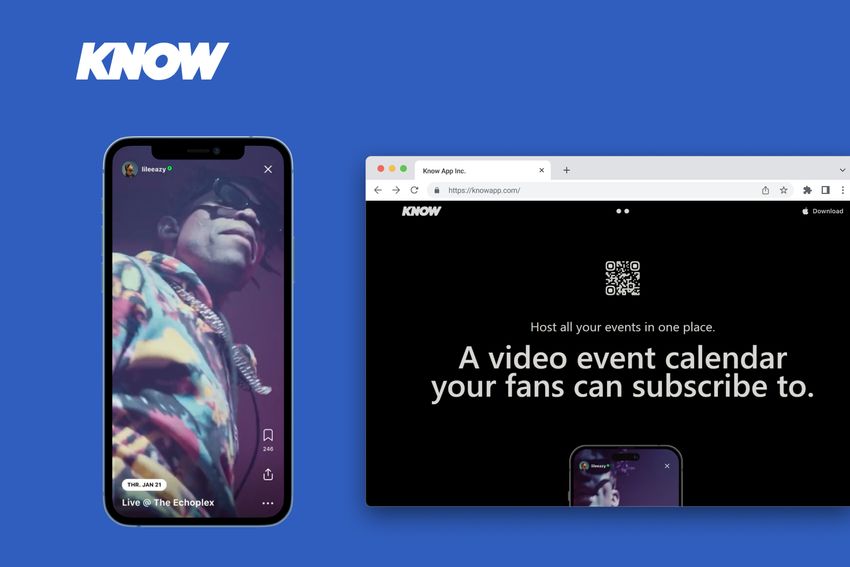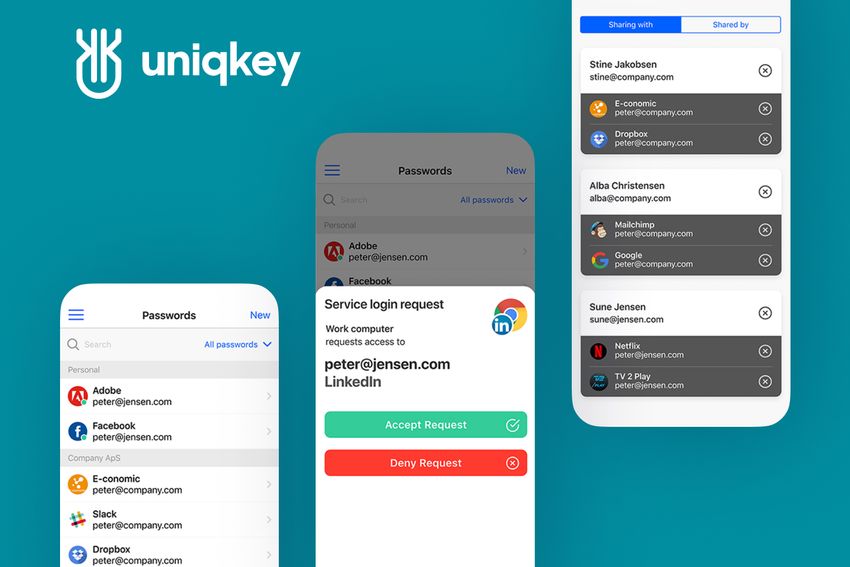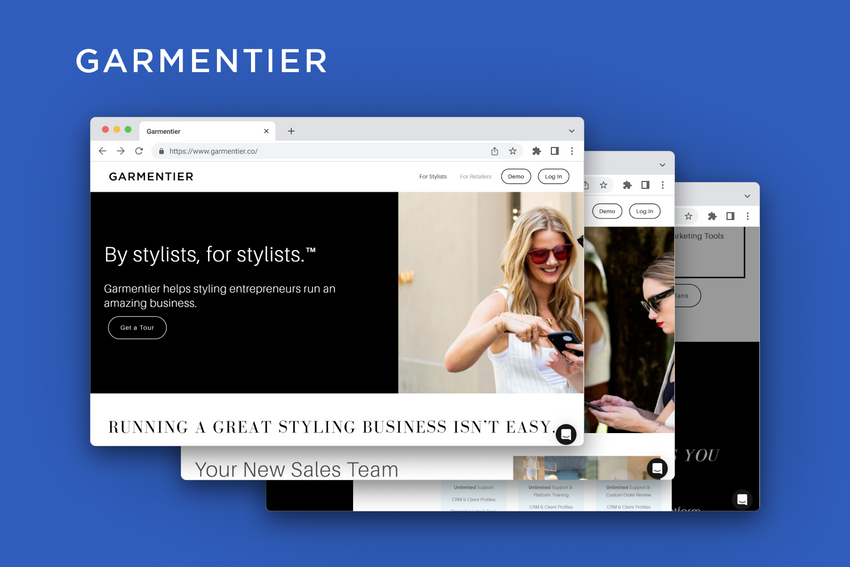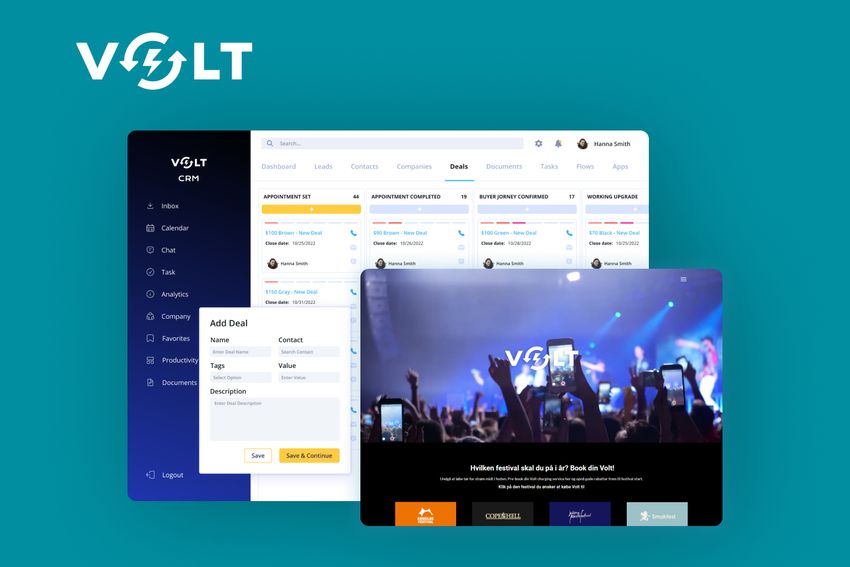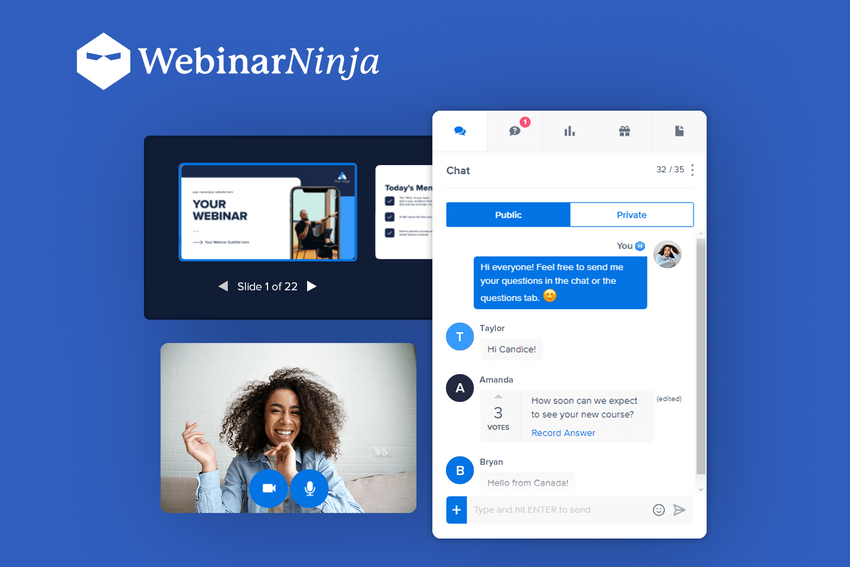Legal Tech Trends 2026: The Future of Law Is Already Here
Explore the major legal tech trends 2026, from automation and predictive analytics to smart contracts and RAG-powered solutions, providing safety, efficiency, and full compliance.
In 2026, the legal industry is undergoing a radical digital transformation: driven by advances in AI Legaltech, automation, blockchain, and data analytics, the industry is not only streamlining workflows but also redefining how lawyers, firms, and clients interact. From AI-powered research tools to automated contract management systems, technology is helping law professionals work smarter, faster, and with greater accuracy.
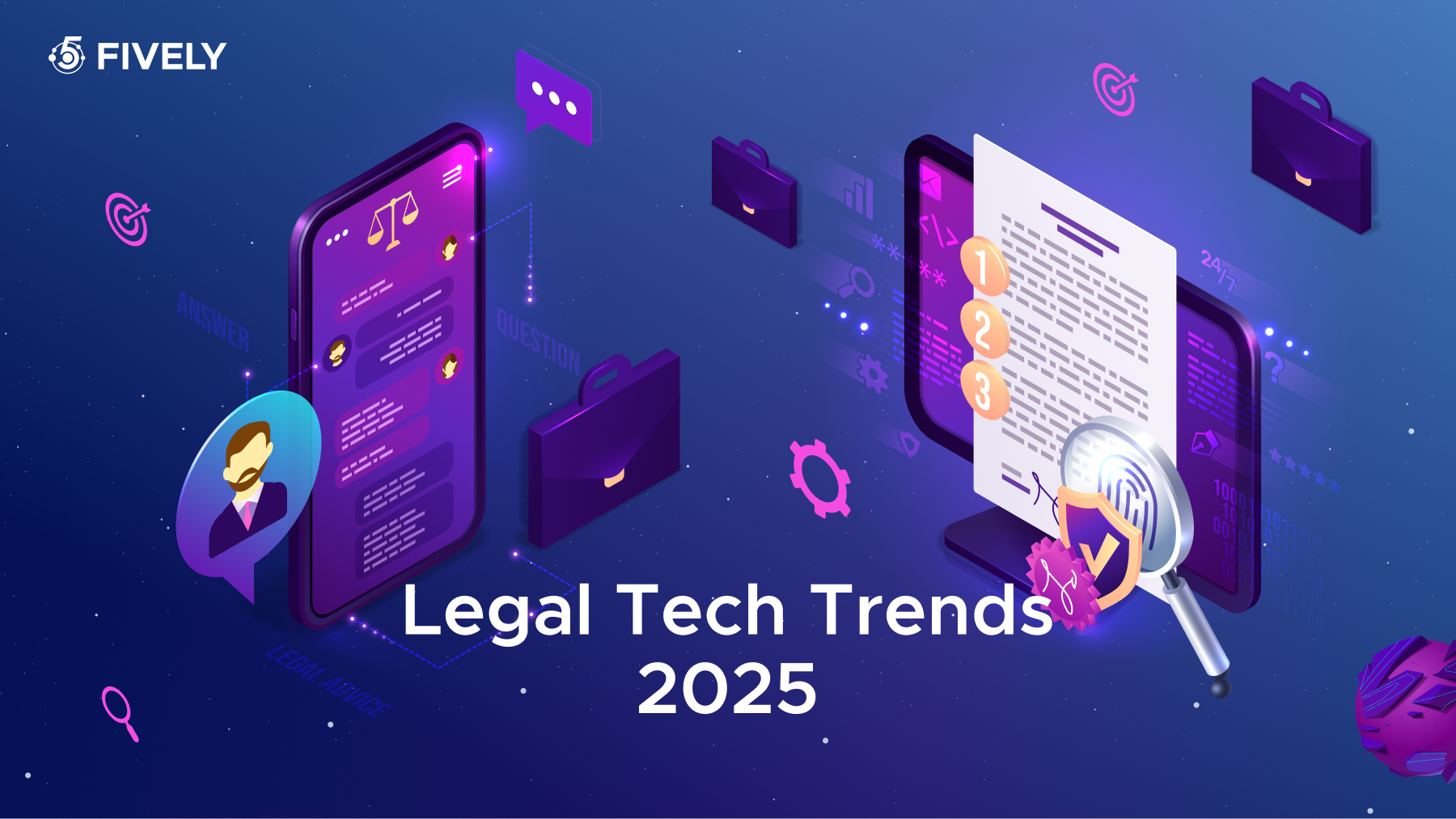
In this article, we’ll explore the top legal technology trends 2026, what they mean for the industry, and how law firms and legal departments can prepare for the future.
Top AI Legal Tech Trends to Watch in 2026
Of course, the list here can be infinite, as the industry is undergoing strong transformation processes, but here’s the list of the major trends according to our experts:
Automating Routine Operations and Document Management with AI
Law firms spend countless hours managing contracts, forms, and scanned documents. AI-powered automation tools now handle document generation, classification, and data extraction with minimal human input.
At Fively, our engineers developed a Legal Document Automation Software — an all-in-one platform for PDF contract automation, data optimization, and seamless management of both scanned and digital contracts. This solution significantly reduced manual work, cut down errors, and gave legal teams more time to focus on strategic tasks.
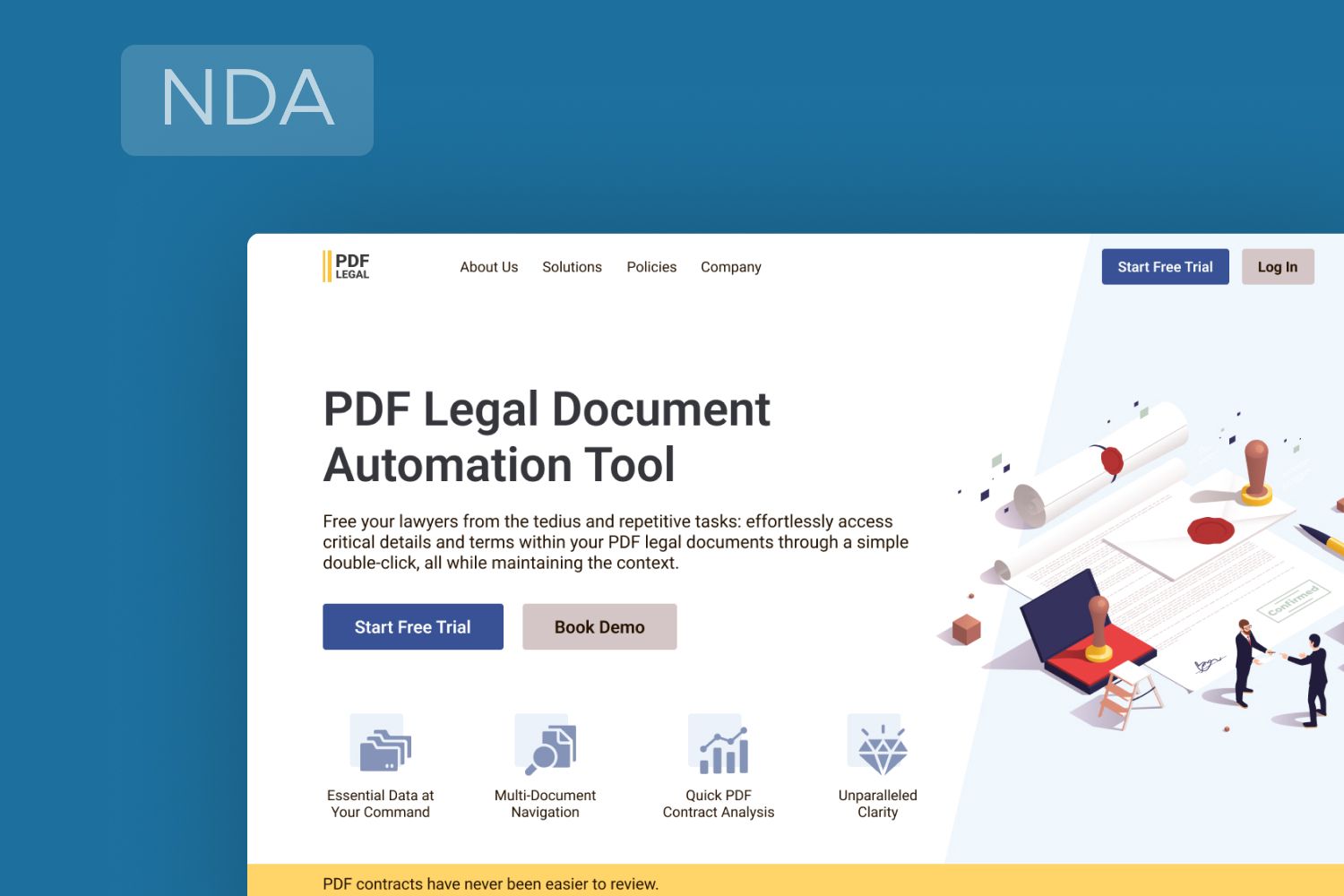
AI-Powered Contract Analysis & Automation
Generative AI can now analyze contracts for risks, compliance issues, and key clauses while suggesting revisions automatically. This trend enables lawyers to accelerate contract reviews, negotiate smarter, and reduce costly oversights.
For example, top Australian firms like Allen & Overy, Gilbert + Tobin, and others are integrating tools like Harvey into their workflows to aid with contract analysis, drafting, and legal research — always under human oversight.
Legal Predictive Analytics
By combining machine learning models with case law databases, judicial history, and litigation records, artificial intelligence can forecast the likelihood of winning a case, estimate settlement probabilities, and assess potential risks before going to trial.
For attorneys, these insights go far beyond raw numbers: predictive analytics allows them to evaluate the strength of arguments, anticipate opposing counsel strategies, and identify patterns in judicial decisions. For example, an artificial intelligence tool might reveal that a particular judge historically favors settlements in certain types of contract disputes, or that specific procedural motions succeed more often under given circumstances. Armed with this knowledge, lawyers can craft stronger case strategies, allocate resources more effectively, and guide clients with higher confidence.
Globally, predictive tools like Lex Machina (by LexisNexis) and Premonition are already helping firms benchmark outcomes and refine strategies, while startups such as Pre/Dicta claim to forecast case dismissals with remarkable accuracy. From the client perspective, predictive analytics delivers greater transparency: instead of vague estimates, they gain data-backed insights into their chances of success, possible timelines, and associated costs.
Legal Chatbots and AI Assistants for Client Support
AI-driven chatbots handle client intake, scheduling, FAQs, and first-level case triage. This improves response times, lowers administrative overhead, and keeps client communication efficient while freeing attorneys to focus on complex matters. Firms worldwide are deploying such assistants to handle administrative tasks efficiently, enabling lawyers to spend more time on strategic work.
Globally, adoption is rising fast. For example:
- DoNotPay, often referred to as “the world’s first robot lawyer,” assists users with tasks such as appealing parking tickets or resolving consumer rights disputes, providing the legal industry with instant support through conversational AI.
- LawDroid in the U.S. helps firms automate client intake, draft documents, and manage conversations — cutting down on time and cost.
- Major firms in Europe and Asia are deploying AI assistants for multilingual support, helping international clients receive consistent information across jurisdictions.
Looking ahead to 2026, chatbots will likely evolve into legal concierges, capable of guiding clients through complex processes such as filing claims, accessing compliance documentation, or reviewing contracts — always with human lawyers providing oversight.
Boosting Attorney Productivity with Generative AI
Generative AI tools assist lawyers by drafting legal documents, reviewing lengthy case files, and summarizing regulations. Attorneys gain productivity boosts while maintaining control over final legal decisions.
The impact is already measurable. Thomson Reuters reports that GenAI solutions are among the top legal tech trends now and save legal professionals nearly 240 hours per year by automating document review, legal research, and contract drafting. That’s equivalent to freeing up six full work weeks annually — time that can be reinvested in client service, business development, or professional growth.
Real-world applications are expanding quickly:
- Firms using Harvey AI (a GPT-based tool) report accelerated contract review and improved legal drafting efficiency.
- Casetext’s CoCounsel is being deployed for tasks like deposition preparation and regulatory compliance review.
- In-house legal teams at major corporations use GenAI to create first drafts of policies and compliance documents, which lawyers then refine.
Importantly, attorneys retain full control over final decisions. Generative AI acts as a co-pilot — delivering speed and insights — while lawyers provide the expertise, judgment, and ethical oversight needed in legal contexts.
Implementation of AI Agents
Unlike traditional AI tools that handle single, narrowly defined tasks, agents are designed to carry out multi-step, goal-oriented workflows autonomously. In the legal industry, this means an agent could receive an instruction like “prepare a motion for summary judgment” and then independently:
- Draft the motion using generative AI.
- Pull relevant precedents from legal databases.
- Cross-check compliance with local regulations.
- Flag potential risks or missing elements for attorney review.
This moves artificial intelligence beyond being a static assistant into the realm of dynamic collaborators, capable of saving lawyers hours of manual effort on complex tasks while ensuring consistency and compliance.
Adoption is still early — less than 1% globally — but momentum is building. Companies such as Salesforce are piloting AI agents to streamline internal workflows, while startups like Eudia are testing specialized agents designed for legal service delivery, including drafting, research, and compliance monitoring. Importantly, these systems are implemented with human oversight built in, ensuring that while the agents handle the heavy lifting, lawyers retain ultimate control and accountability.
Smart Contracts and Blockchain Technology
Smart contracts are quickly moving from theory to one of mainstream adoption across industries such as real estate, insurance, supply chain, and financial services. Unlike traditional contracts that require intermediaries for enforcement, smart contracts are self-executing digital agreements stored on a blockchain. Once predefined conditions are met — for example, a payment is received or a milestone is completed — the contract automatically enforces itself.
This automation reduces the risk of disputes, accelerates deal closure, and minimizes administrative overhead. For example, in real estate, smart contracts can simplify property sales by automatically transferring ownership once the funds are verified. In insurance, claims can be settled instantly once required data is validated. In supply chains, blockchain-powered smart contracts provide transparent and tamper-proof verification of each transaction, boosting trust between multiple parties.
What makes smart contracts particularly powerful in the legal field is their immutability and transparency. Every action is recorded on a blockchain ledger, making it auditable and resistant to manipulation. This builds trust not only between contracting parties but also in regulatory and compliance contexts where accountability is paramount.
Safeguarding Privacy and Confidentiality
With AI handling sensitive legal data, maintaining data security, encryption, and compliance with regulations like GDPR and HIPAA is critical. Firms are investing in privacy-first AI systems that protect client information without compromising functionality, and this is one of the top legal technology trends now. For example, training initiatives like the “AI innovation programme” at UK firm VWV also show commitment to integrating AI responsibly.
Transparency, Trust, and Accountability
Today, law firms must ensure that AI outputs are explainable, auditable, and unbiased. Transparent AI systems help build client trust, meet ethical standards, and reduce risks of relying on “black box” decisions.
In 2026, artificial intelligence is reshaping the future of legal technology through automation, analytics, blockchain, and client-first AI tools. Firms that adopt these technologies early will stay ahead of competitors while ensuring efficiency, accuracy, and trust.
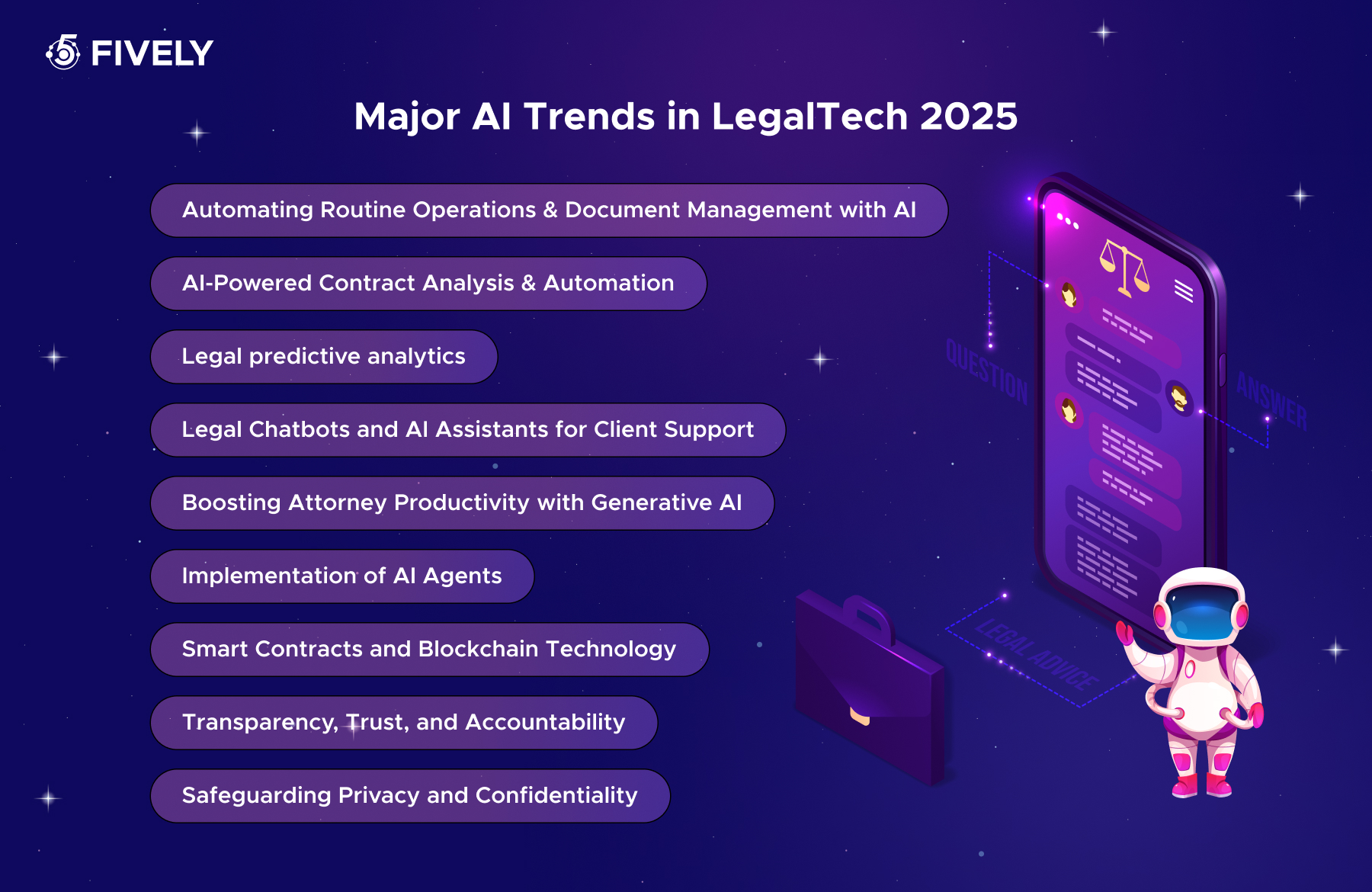
The Future of AI LegalTech
The year 2026 marks a turning point for the legal industry. AI is no longer a supporting tool — it’s becoming a strategic partner in how law firms, corporate legal departments, and independent practitioners operate. From predictive analytics that improve case strategies to assistants that streamline client interactions, technology is shifting the legal profession toward greater speed, accuracy, and accessibility.
Yet the future of AI in legaltech is not just about automation. It’s about building systems that are trustworthy, transparent, and secure, ensuring that lawyers can confidently rely on technology without compromising ethics or client confidentiality.
At Fively, we are helping to shape this future. Our AI legal solutions leverage (RAG) Retrieval-Augmented Generation to ground large language models in domain-specific legal knowledge. This ensures that outputs are precise, explainable, and compliant — a critical factor when dealing with sensitive legal data. From document automation platforms to research assistants, our solutions empower legal professionals to focus on strategic decision-making while leaving repetitive tasks to smart systems.
The firms that succeed in 2026 and beyond will be those that embrace AI not as a replacement, but as a trusted collaborator. With the right tools and partners, the legal profession can step confidently into an era of data-driven insights, faster workflows, and client-first innovation.
Fively’s mission is to help legal teams harness AI safely and effectively — combining world-class engineering with tailored, industry-specific expertise. Feel free to contact us today to build your ideal legal software!
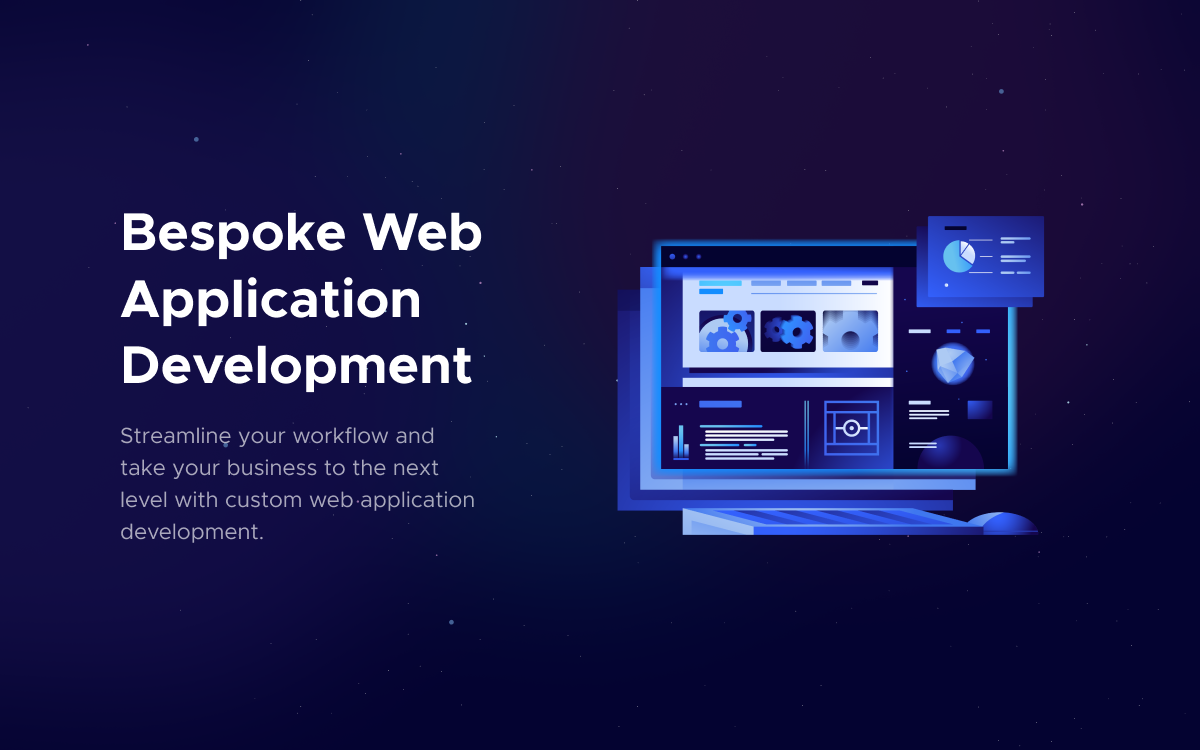
Need Help With A Project?
Drop us a line, let’s arrange a discussion




